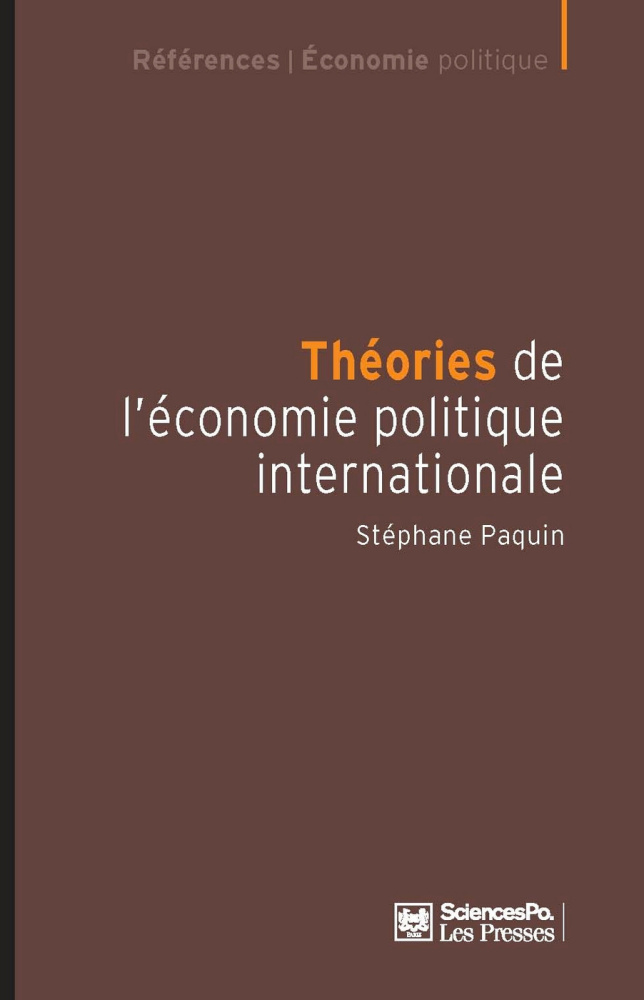Théories de l'économie politique internationale
Cultures scientifiques et hégémonie américaine
First Edition
Born in the 1970s in the US, the UK and Canada, international political economy (IPE) has helped us to understand the transformations of the international scene. A critical overview of the main actors, debates and paradigms that structure the discipline. Read More
Born at the beginning of the 1970s in the United States, the United Kingdom and Canada, international political economy (IPE) has helped us to understand the transformations of the international scene by emphasising their economic dimensions. This approach addresses the interactions between States and the markets, as well as their effects on global politics.
Alongside security concerns, IPE has now become one of the most important disciplines in the broader field of international relations, providing the latter with some of its most innovative concepts: globalisation, complex interdependence, hegemonic stability, structural power, world governance, etc. It has also given birth to various theories, the major ones of which have been defended by two largely incompatible schools of thought: the orthodox school, based in the United States, and the heterodox school, predominant in the United Kingdom and very present in Canada and throughout the world.
As a critical overview designed for French-speaking internationalists, this book presents the main actors, debates and paradigms that structure the discipline.
Specifications
- Publisher
- Presses de Sciences Po
- Author
- Stéphane Paquin,
- Collection
- Références
- Language
- French
- Tags
- ,
- Publisher Category
- > Political Economics > Economic Theory
- Publisher Category
- > Political Economics
- Publisher Category
- > Politics
- Publisher Category
- > Society
- BISAC Subject Heading
- POL000000 POLITICAL SCIENCE
- Onix Audience Codes
- 06 Professional and scholarly
- CLIL (Version 2013-2019)
- 3283 SCIENCES POLITIQUES
- Credit
- Presses de Sciences po
- Title First Published
- 28 May 2013
- Subject Scheme Identifier Code
- Thema subject category: Politics and government
- ONIX Adult Audience Rating
- Thema subject category
Paperback
- Publication Date
- 01 March 2010
- ISBN-13
- 978-2-7246-3188-3
- Code
- 9782724631883
- Weight
- 430 grams
- List Price
- 19.00 €
- ONIX XML
- Version 2.1, Version 3
Google Book Preview
Contents
Introduction
Chapitre 1 / L'économie politique internationale
Qu’est-ce que l’EPI ?
Les origines de l’EPI
Les économistes et l’EPI
Les acteurs fondamentaux de l’EPI
Le niveau d’analyse et la rationalité des acteurs
Conclusion
Chapitre 2 / Les perspectives théoriques et épistémologiques en EPI
Les États-Unis contre le reste du monde
Le reste du monde face aux États-Unis
Les auteurs de référence
La grande division épistémologique et méthodologique
L’épistémologie positiviste en EPI
Conclusion
Chapitre 3 / Qu’est-ce qu’une (bonne) théorie en économie politique internationale ?
Pourquoi théoriser l’EPI ?
Théorie explicative et compréhensive
La théorie : plusieurs définitions
La portée des théories
La théorisation selon l’approche orthodoxe
La théorisation selon l’approche hétérodoxe
La théorisation selon Susan Strange
La théorisation chez les néogramsciens
Conclusion
Chapitre 4 / La perspective réaliste
Les postulats fondamentaux de la perspective réaliste en EPI
La mondialisation n’est pas coupable
La puissance et la théorie de la stabilité hégémonique
La puissance et les relations entre les États
Conclusion
Chapitre 5 / La perspective libérale
Les postulats fondamentaux de la perspective libérale en EPI
Le transnationalisme
L’institutionnalisme libéral
La conception rationnelle des institutions
La conformité et la crédibilité des engagements internationaux
Conclusion
Chapitre 6 / La perspective axée sur la politique intérieure
Les intérêts
Les idées
Les institutions
Les effets de la mondialisation sur l’État-nation
Conclusion
Chapitre 7 / Les perspectives hétérodoxes : l’école britannique
L’école hétérodoxe britannique en EPI
La mondialisation
Le pouvoir et la puissance structurelle
Le marché
La finance
Conclusion
Chapitre 8 / Les perspectives hétérodoxes : l’école néogramscienne
Robert Cox
La redécouverte de Gramsci
Stephen Gill
Mark Rupert
Conclusion
Conclusion générale
Bibliographie sélective

